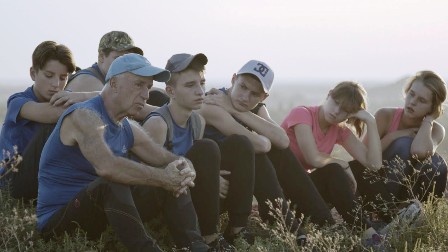


DocuDays 20th Edition 2023 Opening

I was in Kyiv last night. Again. For the opening of the 20th edition of the DocuDays ua International Human Rights Documentary Festival. Online via Facebook. It was like it was before in the Zhovten Cinema: An opening with speeches in Ukrainian and English including one from a representative from the main sponsor of the festival, the Swedish Embassy in Ukraine (bravo Sweden for the continuous support), clips from the many competition programmes, a hall full of spectators…
And yet it was different. Of course it was. Ukraine is at war. The film program illustrates this and there were strong emotional moments of demonstration and commemoration during the opening ceremony:
The whole hall of spectators stood up with signs “#free Maksym Butkevych”, the human rights activist and journalist, who was working with the festival and who was captured by the occupiers and sentenced to 13 years of prison for “his support for IDPs during the war in Donbas and because of his history as a journalist for the BBC…”being “labelled as a neo-nazi and British spy” (Wikipedia).
Dary’a Averchenko, head of the festival’s communication department, made a speech that commemorated film editor Victor Onysko “who died defending Ukraine”. His widow Olga Birzul curated a program “Editing Transition” in memory of her husband. On the festival website (https://docudays.ua/eng/2023/news/intervyu/kritichniy-poglyad-na-kino-musit-buti-bazovoyu-navichkoyu-olga-birzul-pro-programu-montazhniy-perekhid/) there is an interview with Birzul, who for many years took part in the programming of the festival. I remember Roman Bondarchuk, director and art director of the festival characterized her as “the soul of the festival”. A quote from the interview:
… First of all, I wanted to talk in detail about the whole variety of montage in this programme: as a technique, a political gesture, a reconstruction of memory and a time machine. I tried to show the scale of this phenomenon. After all, montage is the grammar of the film language. Before the emergence of montage theory, cinema was pure entertainment. After that, it became an art.
At first, I chose three films, as you say, political ones: The March on Rome by Mark Cousins, Private Footage by Janaína Nagata and Arcadia by Paul Wright. Together with their critical optics, they all are just suited for a montage cinema slot. But I couldn’t get Lea Glob’s beautiful Apolonia, Apolonia out of my mind. I felt that conceptually it was a bit out of place. It’s a personal and even confessional film, which, by the way, also includes a lot of politics and activism, but at the same time, editing stops playing a major role there. The film is not cut up or used as a method of researching reality. In Apolonia, Apolonia, we see the other side of documentary cinema – a work with time…
Ahhh, clever words. The festival opened with the film by Alisa Kovalenko, reviewed/ praised on this site, “We Will not Fade Away”, a masterpiece.
still: we will not fade away